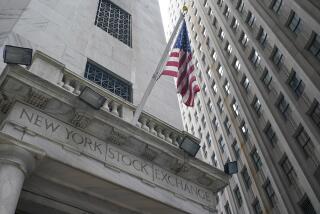Argentine Markets Tumble on Prospect of Debt Default
- Share via
MEXICO CITY — Argentina’s stocks and bonds fell dramatically Monday on investors’ growing skepticism that the country’s efforts to avert economic and political collapse would succeed.
The market decline occurred against a background of fading political support for President Fernando de la Rua and his finance minister, Domingo Cavallo. The country also found itself in a nasty spat with Brazil over comments Cavallo made over the weekend hinting that Brazil used its weak currency to gain unfair trade advantages.
The markets also were rocked by the resignation for personal reasons of a key member of Cavallo’s economic team, Finance Undersecretary Julio Dreizzen. De la Rua also reshuffled other Cabinet positions.
“The Dreizzen resignation is a no-vote of confidence at the worst possible time,” said Siobhan Manning Morden, a sovereign debt analyst with Caboto Gruppo-IntesaBci in New York.
Argentina’s Merval stock index fell 8.7% to 219.54 while a benchmark government bond, a floating-rate issue due in 2005, dived to $54.80 per $100 face value Monday from $63.45 on Friday.
A widely followed yield index of Argentine bonds rose above 2,000, meaning that investors are demanding a premium of 20 percentage points above comparable U.S. bonds. It’s a sign that international traders believe default on some or all of Argentina’s $130 billion in debt is inevitable.
Markets apparently are losing faith in De la Rua’s last-ditch efforts to fashion an economic package that would lessen the debt load on the federal government and the provinces but which outside analysts warn could constitute a de facto default.
De la Rua and Cavallo are trying to persuade banks to accept longer terms and lower interest payments on money owed them by the various provinces. They also are working with pension funds to restructure federal debt.
If successful, the package would lessen the amount the federal government pays in revenue transfers to the provinces, easing its debt crunch.
The plan has been held up partly by threats of debt-rating agencies Moody’s and Standard & Poor’s to reclassify Argentina debt as being in “selective default,” said Morden of Caboto Gruppo-IntesaBci.
Meanwhile, a rising chorus of Cavallo political opponents are calling for the nation to stop paying on its debts, a movement that is isolating Cavallo. De la Rua’s party suffered a drubbing in congressional elections this month.
The shock waves from Monday’s events were limited to Brazil and Ecuador among Latin American markets.
Brazil’s Bovespa stock index lost 3.4%. An index of Brazilian bonds rose to yield 11.9 points above comparable U.S. government issues.
More to Read
Sign up for Essential California
The most important California stories and recommendations in your inbox every morning.
You may occasionally receive promotional content from the Los Angeles Times.










